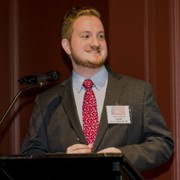DeSantis staffer fired for posting Nazi symbol had recurring focus on fascism
Nate Hochman had praised a fascist leader, cited fascist thinkers and questioned the difference between fascism and conservatism.

An image of Gov. Ron DeSantis with a Nazi symbol from a video that was briefly on social media. Image from a video posted by Ron DeSantis fancams
The DeSantis campaign speechwriter who was fired after retweeting and allegedly creating a hype video for Florida’s governor using Nazi imagery had a history of focusing on fascism before being hired by the campaign.
Nate Hochman created a firestorm on social media by retweeting a meme video from the Ron DeSantis Fancams Twitter account that included the Sonnenrad, a symbol appropriated by the Nazis and used by current white supremacist groups. Anonymous sources that spoke with Axios claim Hochman created the video.
But that's not the first brush Hochman – a former staff writer for the conservative outlet National Review and once touted as a “radical young intellectual who wants to take over the American Right” by The New Republic – had with fascism. Prior to joining the DeSantis campaign, he referenced far-right figures in his articles, held a virtual meeting with a leader of the online fascist movement and goaded left-wing figures to define the difference between fascism and conservatism in since-deleted Twitter posts. He also wrote about connections he saw between white nationalist thinkers and prominent leaders in the current conservative movement.
The most high profile of his run-ins was when he participated in a Twitter Space in 2022 with Nick Fuentes, a prominent white supremacist who has praised Adolf Hitler and famously dined with Kanye West and Donald Trump. In the online discussion last year, Hochman praised Fuentes. “We were just talking about your influence and we were saying, like, you’ve gotten a lot of kids ‘based’ and we respect that for sure,” Hochman said. “I literally said, I think Nick’s probably a better influence than Ben Shapiro on young men who might otherwise be conservative.”
Hochman went on to denounce Fuentes in the Bulwark in March when the outlet originally covered the discussion and wrote a piece critical of him.
Hochman also spurred public debate about what it means to be fascist. In an article titled “The Left’s ‘Fascism’ Problem” published in December 2022, he discussed his since-deleted Twitter post challenging left-wingers to distinguish “fascism from ‘normal’ right-wing politics.” In it, he questioned whether there are actually any clear differences between academic definitions of fascism and modern conservatism. While he wrote that he does not “think of himself as a fascist” and has “no problem differentiating my own politics from fascism,” he added that “much of the literature on the difference between conservatism and fascism is oddly lacking in ideological specificity.”
In January, prior to being hired by the DeSantis campaign, he penned a piece defending DeSantis from facism allegations. In it, Hochman argued that “legacy media outlets such as CNN are primarily activists, not journalists” and they “already assume to know that Ron DeSantis is Floridian Hitler.”
In other articles, Hochman offered admiring appraisals of the ideas from several far-right thinkers whose work underpins the white supremacist movement.
In two articles, one published in the New York Times in June 2022 and another in National Review in February 2023, Hochman quoted and spoke positively about some of the ideas of Sam Francis, a late 20th century American white supremacist dubbed the “philosopher king” of the radical right by analysts and labeled an extremist by the Southern Poverty Law Center. He also discussed Alain de Benoist, the leader of the French ethno-nationalist think tank GRECE and an inspiration for America’s current alt-right movement.
The essays are long, academic pieces with no explicit calls for policy – and no specific references to fascism or fascist ideology – but they positively frame ideas from Francis and de Benoist alongside those of younger conservatives like DeSantis, Christopher Rufo and Tucker Carlson. Hochman cites the notion that the right must move in a secular direction and seize the cultural levers of society, like academia and the media (similar to the strategy outlined by 20th century Marxist Antonio Gramsci and what Hochman argues “the left” is currently doing) to effect societal change, such as reversing diversity initiatives and the legalization of gay marriage.
“If the Right hopes to regain a footing in arts, schools, and intellectual life, it will have to become comfortable thinking of itself as an insurgent outsider in American culture, just as the Gramscian vanguard was before the 1960s,” Hochman wrote in National Review.
In the historical context of de Benoist and Francis, Hochman wrote that Rufo, DeSantis and Carlson are ushering in “a new kind of conservatism” focused on cultural institutions. He argued that Rufo seems to have the same clarity about institutions as de Benoist. “American conservatives have now taken a growing interest themselves. Rufo routinely cites the Marxist as both an important influence on the New Left and a potential inspiration for the Right,” Hochman wrote.
Hochman did not immediately respond to a request for comment for this story. When asked about Hochman’s employment from several outlets including CNN, a spokesperson for DeSantis’ campaign said, “Nate Hochman is no longer with the campaign. And we will not be commenting on him further.” The campaign did not respond to a request for comment from City & State.
